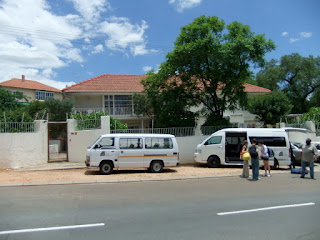
Lauren Komp, Maggie DePoy, Andy Schwich
Our second week in Southern Africa continued the whirlwind pace of the first. After returning from our home-stays in Soweto, we packed to leave Johannesburg behind and spend two days in Pretoria, the executive and de facto capital of South Africa.
Our route to Pretoria took us through Alexandra township, in which Mark Mathabane grew up and later set the stage of his memoir of Apartheid South Africa, Kaffir Boy. The township is still marked by devastating poverty, although government programs to provide affordable housing are progressing. Seeing this poverty made us feel a sense of helplessness. We were shocked to see how Apartheid could cause this.
A relaxing night in Pretoria preceded an early morning expedition to the Voortrekker Monument outside of town. The monument celebrates the Great Trek made by the Boers from the Cape Colony to the Transvaal in what is now Eastern South Africa between 1835 and 1854. Many of us found the monument to be troubling, especially in the carved stone reliefs depicting scenes of interaction and violence between Voortrekkers and African natives, particularly the Zulu. The celebration of the migration is similar to American commemorations of Westward Expansion into Native American territories. The Monument, unveiled in 1937, provided a stark contrast to the post-Apartheid built Hector Pieterson and Apartheid Museums that we had earlier visited. Also noteworthy was the fact that the visitors at the Monument were primarily non-Black.
After eating a quick picnic lunch at a park near the monument, we went to the Union Buildings and surrounding gardens. The beautiful gardens are adorned with monuments to noteworthy South Africans and war memorials. The Union Buildings are the official seat of the South African government, and also hold the offices of the President and the Department of Foreign Affairs.
We also paid a visit to the US Embassy. Once we passed security with flying colors (red, white, and blue), we heard from a Foreign Service deputy concerned with the United States’ role in domestic affairs in South Africa. He told us about the US efforts in education, corruption prevention, and health issues. He also compared US businesses in South Africa to the expanding Chinese presence. To illustrate the powerful role that the United States plays, and will continue to play in the region, he told us an anecdote from a talk he gave at a South African classroom. He asked the class to raise their hands if they had ever held a Chinese Yuan. One or two students raised a hand. Then, he asked how many of them had ever held an American Dollar, and every single student put a hand in the air (like they just didn’t care). It was an interesting demonstration of the global influence of the US, especially contrasted with the feeling among many Americans that we are falling behind as China continues to surge.
After a delicious dinner at a Tuscan Barbecue Buffet we hit the hay in anticipation of leaving the hotel at six the next morning to fly to Hosea Kutako International Airport in Windhoek, Namibia. We landed in a surprisingly lush, unsurprisingly hot landscape, excited to start our three months in a new land. After a scenic drive from the airport to our new home reality set in that we were in Namibia and would be for quite some time. After a thorough and intense orientation to the CGE compound, we relaxed by the pool for the afternoon and enjoyed our first dinner at the house.
The next morning we set off on a tour of Windhoek with a professional guide who showed us many different spots in the city. During our group reflection session after the tour many of us discussed our conflicting emotions about the contrast between the beauty of the landscape and the dire poverty of the informal settlements in Katutura, which houses about 80,000 of the 150,000 residents of Katutura.
The next day, we spread out across the city to visit organizations that fulfill various roles in the community. Andy met with the director of the Swapo Youth League and discussed their political perspectives while respectfully debating foreign policy, especially with regards to Zimbabwe. Lauren and Maggie went to Megameno orphanage and met with the woman who founded and currently runs it. We were inspired to learn that she started the orphanage because she couldn’t stand to see children left homeless with no one to look after them, and therefore took it upon herself to take action and make a difference in their lives. At the same time, we were shocked and saddened to hear that she receives zero funding from the government and relies entirely on donations. We imagine that she is forced to make a lot of difficult decisions about where to allocate the minimal money that she has. Several other students visited the orphanage as well and because of the fun we had with all of the kids we plan to return throughout the semester!
Our busy week led into an exciting weekend in which we were introduced to the fun nightlife in Windhoek. The highlight of the weekend for most of us was a fundraiser concert at Zoo Park for the victims of the earthquake in Haiti. We enjoyed hearing a lot of the popular local artists and experiencing the culture in Windhoek. It was a chance for us to let loose knowing that on Monday another busy week would begin.




No comments:
Post a Comment